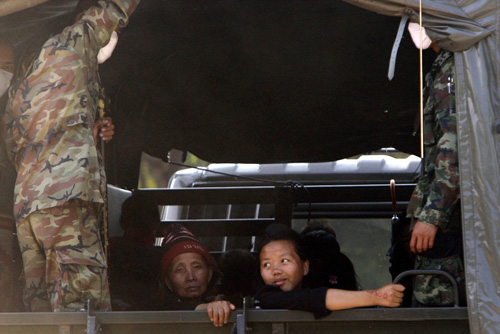1) MPR’s Lorna Benson has done some of the best H1N1 coverage in Minnesota. For all of the years of planning for a flu pandemic in the U.S., she reports, the less-than-crippling H1N1 flu revealed some serious weak spots.
One of them, apparently, was the reliance on private clinics rather than a government vaccination program. But the army of health care workers that used to be available for such mobilizations, no longer exists.
2) Senior citizens from the United States are heading to Mexico. It’s not for the warmth, PBS Newshour reports, it’s for the health care.
You might’ve noticed that video started with an advertisement. And that’s driving David Fanning crazy. He was the founding producer of Frontline, one of the staples of PBS. In a lecture at the Annenburg School at USC, Fanning blasted increasing commercialization in public broadcasting.
“I’ve argued strenuously that we are threatening our special status as non-commercial media … we all swim in a sea of commercialism, and that’s precisely why we need to keep ourselves clean of it,” he said. “One day, I’m afraid, when most of our work is experienced on the web, we will wake up and the public will say we’re no different from the rest of them. Why should we give you our membership money? And why should the government give you our tax dollars?”
OK, I’ll bite. What makes “us” different. Because public broadcasting’s revenue and ability to apply resources to a story, is reflected in the quality of the content.
3) Thirty-seven years ago tonight, Eastern Airlines Flight 401 crashed into the Florida Everglades. The flight crew was distracted with a faulty landing gear light and they didn’t realize their jet was heading down. It led to a rewriting of the aviation books when it comes to emergencies. Item number one on the list now is “Fly the plane.” A group of survivors is reuniting in Florida. The Miami Herald has an outstanding Web site about the crash here.
4) One picture:

While U.S. officials were focusing attention on the uprising in Iran, Thailand completed the deportation of 4,000 Hmong people who sought refuge there. They’ve been returned to Laos. Thailand did not allow the United Nations to assess if any of the total 4,371 expelled from the camp were political refugees.
But it didn’t stop there. It also sent back over 100 people who had been granted refugee status by the UN.
“My aunt is really worried about going back to Laos and she’s really scared,” Amee Xiong of St. Paul told MPR’s Brandt Williams. “She has five children under the age of 18, they’re young. She’s really scared, if they return to Laos, of the consequences that will happen to her family.”
5) It’s not easy being green. From Discover.com:
Wind turbines, energy-efficient light bulbs, and hybrid cars and three of the most iconic products in the lineup of green technologies that can help us build a cleaner world. But in an ironic twist, these technologies all rely on elements called rare earths, which are primarily extracted from environmentally destructive mines in China.
Bonus: The ruling on the field stands. Adrian Peterson fumbled the ball on the Vikings first possession in overtime in Chicago last night, sending the Vikings to another loss. Let’s remember the good times:
TODAY’S QUESTION
The attempted attack on a Northwest flight to Detroit seems likely to prompt changes in security procedures. Getting on a plane may require more body scans and pat-downs. How far should authorities go to protect air travelers from terrorists?
WHAT WE’RE DOING
Midmorning (9-11 a.m.) – First hour: The year in medicine.
Second hour: What television viewers can expect in the coming years.
Midday (11 a.m. – 1 p.m.) – First hour: An update on aviation security from Douglas Laird, former chief of aviation security for Northwest Airlines and now an international aviation security consultant.
Second hour: NPR reporter Barbara Bradley Haggerty, speaking about her book “Fingerprints of God: The Search for the Science of Spirituality.” She spoke as part of MPR’s Broadcast Journalist Series.
Talk of the Nation (1-3 p.m.) – First hour: Hard won lessons of how to cover a difficult war.
Second hour: Alan Brinkley’s new biography of the man he calls the most important individual of the 20th century — Franklin Delano Roosevelt
All Things Considered (3-6:30 p.m.) – A look at California’s only ethnic group that reliably vote Republican — Vietnamese.
